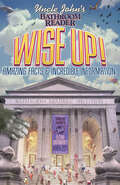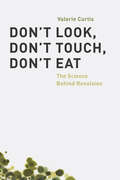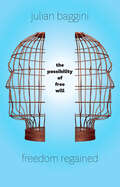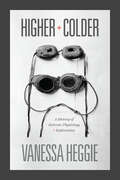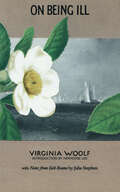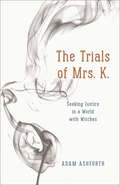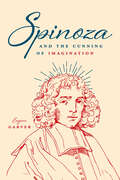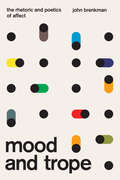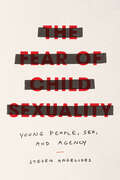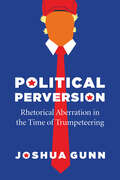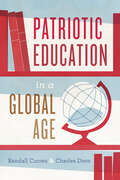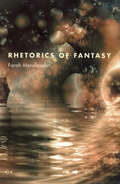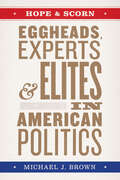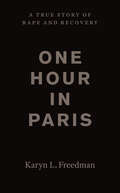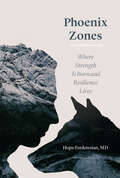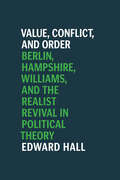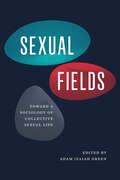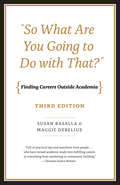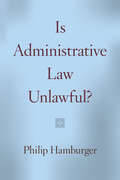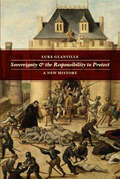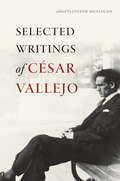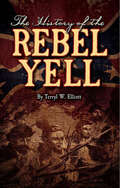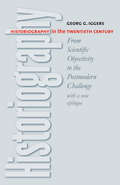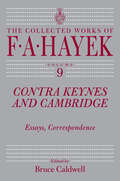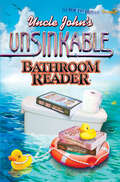- Table View
- List View
Uncle John's Bathroom Reader: An Elevating Collection of Quick Facts and Incredible Curiosities (Uncle John's Bathroom Reader)
by Bathroom Readers' InstituteWith this volume filled with thousands of bizarrely fascinating facts, we&’re on a roll! Is there any other single book in the universe with this many awesome tidbits of bite-sized information? Nope. And that&’s a fact! At nearly 400 pages (with a handy index for your fact-seeking convenience), Wise Up! is a must-have for anyone who likes their information on the go. It&’s organized into hundreds of topics—everything from sports and entertainment to word origins and science. Here are but a few of the facts awaiting you: * More women than men talk to their cars. * The melody for Nat King Cole&’s 1954 hit &“Smile&” was composed by Charlie Chaplin. * Acid rain was first identified and named in 1852. * What is your buccal cavity? Your mouth. * There are no skunks in Newfoundland. * The average Super Bowl party has 18 people. * When dropped in water, a fresh egg will sink; a stale one won&’t. * The average newborn baby spends 113 minutes a day crying. * Pepper was so valuable during Elizabethan times that it was sold by the grain. * Fossilized termite farts have been preserved in amber. And thousands more!
Don't Look, Don't Touch, Don't Eat: The Science Behind Revulsion
by Valerie CurtisA scientist delves into what disgusts us and why: “For a book riddled with rancid and revolting things, [it] is surprisingly difficult to put down.” —Times Literary SupplementEvery flu season, sneezing, coughing, and graphic throat-clearing become background noise in workplaces. And coworkers tend to move as far—and as quickly—away from the source of these bodily eruptions as possible. Instinctively, humans recoil from objects that they view as dirty and even struggle to overcome feelings of discomfort once the offending item has been cleaned. These reactions are universal, and although there are cultural and individual variations, by and large we are all disgusted by the same things.In this book, Valerie Curtis builds a strong case for disgust as a “shadow emotion”—less familiar than love or sadness, it nevertheless affects our day-to-day lives. In disgust, biological and sociocultural factors meet in dynamic ways to shape human and animal behavior. Curtis traces the evolutionary role of disgust in disease prevention and hygiene, but also shows that it is much more than a biological mechanism. Human social norms, from good manners to moral behavior, are deeply rooted in our sense of disgust. The disgust reaction informs both our political opinions and our darkest tendencies, such as misogyny and racism. Through a deeper understanding of disgust, Curtis argues, we can take this ubiquitous human emotion and direct it towards useful ends, from combating prejudice to reducing disease.“Curtis, one of the deepest thinkers and cleverest researchers on this part of human nature, turns revulsion into fascination.” —Steven Pinker“Great fun.” —Toronto Star
Freedom Regained: The Possibility of Free Will
by Julian Baggini“For anyone who has ever given serious thought to the degree to which our actions are within our own control, Freedom Regained will give you a lot to chew on.” —Spectrum CultureIt’s a question that’s puzzled philosophers and theologians for centuries and is at the heart of numerous political, social, and personal concerns: Do we have free will? In this cogent, compelling book, Julian Baggini explores the concept of free will from every angle, blending philosophy, sociology, and cognitive science to find rich new insights on the intractable questions that plague us. Are we products of our culture, or free agents within it? Are our neural pathways fixed early on by a mix of nature and nurture, or is the possibility of comprehensive, intentional psychological change always open to us? And what, exactly, are we talking about when we talk about “freedom” anyway?Freedom Regained brings the issues raised by the possibilities—and denials—of free will to thought-provoking life, drawing on scientific research and fascinating encounters with everyone from artists to prisoners to dissidents. Baggini looks at what it means to be material beings in a universe of natural laws. He asks if there’s any difference between ourselves and the brains from which we seem never able to escape. He throws down the wild cards and plays them to the fullest: What about art? What about addiction? What about twins? And he asks, of course, what this all means for politics.Ultimately, Baggini challenges those who think free will is an illusion. Moving from doubt to optimism to a hedged acceptance of free will, he ultimately lands on a satisfying conclusion: It is something we earn. The result is a highly engaging, new, and more positive understanding of our sense of personal freedom, a freedom that is definitely worth having.“Entertaining.” —The Wall Street Journal“While firmly rooted in the philosophical tradition, Baggini also gets out and talks to people for whom freedom—and lack of it—is a real and pressing matter.” —Literary Review
Higher and Colder: A History of Extreme Physiology and Exploration
by Vanessa HeggieDuring the long twentieth century, explorers went in unprecedented numbers to the hottest, coldest, and highest points on the globe. Taking us from the Himalaya to Antarctica and beyond, Higher and Colder presents the first history of extreme physiology, the study of the human body at its physical limits. Each chapter explores a seminal question in the history of science, while also showing how the apparently exotic locations and experiments contributed to broader political and social shifts in twentieth-century scientific thinking. Unlike most books on modern biomedicine, Higher and Colder focuses on fieldwork, expeditions, and exploration, and in doing so provides a welcome alternative to laboratory-dominated accounts of the history of modern life sciences. Though centered on male-dominated practices—science and exploration—it recovers the stories of women’s contributions that were sometimes accidentally, and sometimes deliberately, erased. Engaging and provocative, this book is a history of the scientists and physiologists who face challenges that are physically demanding, frequently dangerous, and sometimes fatal, in the interest of advancing modern science and pushing the boundaries of human ability.
On Being Ill: with Notes from Sick Rooms by Julia Stephen
by Virginia WoolfVirginia Woolf&’s daring essay on how illness transforms our perception, plus an essay by Woolf&’s mother from the caregiver&’s perspective: &“Revelatory.&” —Booklist This new publication of &“On Being Ill&” with &“Notes from Sick Rooms&” presents Virginia Woolf and her mother, Julia Stephen, in textual conversation for the first time in literary history. In the poignant and humorous essay &“On Being Ill,&” Woolf observes that though illness is part of every human being&’s experience, it is not celebrated as a subject of great literature in the way that love and war are embraced by writers and readers. We must, Woolf says, invent a new language to describe pain. Illness, she observes, enhances our perceptions and reduces self-consciousness; it is &“the great confessional.&” Woolf discusses the taboos associated with illness, and she explores how it changes our relationship to the world around us. &“Notes from Sick Rooms,&” meanwhile, addresses illness from the caregiver&’s perspective. With clarity, humor, and pathos, Julia Stephen offers concrete information that remains useful to nurses and caregivers today. This edition also includes an introduction to &“Notes from Sick Rooms&” by Mark Hussey, founding editor of Woolf Studies Annual, and a poignant afterword by Rita Charon, MD, founder of the field of Narrative Medicine. In addition, Hermione Lee&’s brilliant introduction to &“On Being Ill&” offers a superb overview of Woolf&’s life and writing. &“Woolf&’s inquiry into illness and its impact on the mind is paired with her mother&’s observations about caring for the body. Julia Stephen . . . had no professional training but took to heart Florence Nightingale&’s precept that every woman is a nurse and emulated Nightingale&’s best-selling Notes on Nursing with her own &“Notes from Sick Rooms.&” In this long-overlooked, precise, and piquant little manual, Stephen is compassionate and ironic, observing that everyone deserves to be tenderly nursed while addressing the small evil of crumbs in bed. This unprecedented literary reunion of mother and daughter is stunning on many fronts, but physician and literary scholar Rita Charon focuses on the essentials in her astute afterword, writing that Woolf&’s perspective as a patient and Stephen&’s as a nurse together illuminate the goal of care—to listen, to recognize, to imagine, to honor.&” —Booklist &“Woolf and Stephen will certainly change the way readers think of illness.&” —Publishers Weekly
The Trials of Mrs. K.: Seeking Justice in a World with Witches
by Adam AshforthIn March 2009, in a small town in Malawi, a nurse at the local hospital was accused of teaching witchcraft to children. Amid swirling rumors, “Mrs. K.” tried to defend her reputation, but the community nevertheless grew increasingly hostile. The legal, social, and psychological trials that she endured in the struggle to clear her name left her life in shambles, and she died a few years later. In The Trials of Mrs. K., Adam Ashforth studies this and similar stories of witchcraft that continue to circulate in Malawi. At the heart of the book is Ashforth’s desire to understand how claims to truth, the pursuit of justice, and demands for security work in contemporary Africa, where stories of witchcraft can be terrifying. Guiding us through the history of legal customs and their interactions with the court of public opinion, Ashforth asks challenging questions about responsibility, occult forces, and the imperfect but vital mechanisms of law. A beautifully written and provocative book, The Trials of Mrs. K. will be an essential text for understanding what justice means in a fragile and dangerous world.
Spinoza and the Cunning of Imagination
by Eugene GarverSpinoza’s Ethics, and its project of proving ethical truths through the geometric method, have attracted and challenged readers for more than three hundred years. In Spinoza and the Cunning of Imagination, Eugene Garver uses the imagination as a guiding thread to this work. Other readers have looked at the imagination to account for Spinoza’s understanding of politics and religion, but this is the first inquiry to see it as central to the Ethics as a whole—imagination as a quality to be cultivated, and not simply overcome. ?Spinoza initially presents imagination as an inadequate and confused way of thinking, always inferior to ideas that adequately represent things as they are. It would seem to follow that one ought to purge the mind of imaginative ideas and replace them with rational ideas as soon as possible, but as Garver shows, the Ethics don’t allow for this ultimate ethical act until one has cultivated a powerful imagination. This is, for Garver, “the cunning of imagination.” The simple plot of progress becomes, because of the imagination, a complex journey full of reversals and discoveries. For Garver, the “cunning” of the imagination resides in our ability to use imagination to rise above it.
Mood and Trope: The Rhetoric and Poetics of Affect
by John Brenkman“Reconnect[s] affect studies with major issues in literary studies, philosophy, and aesthetics. . . . a fundamental contribution to this emergent field.” —Jonathan Culler, Cornell University, author of Structuralist PoeticsIn Mood and Trope, John Brenkman introduces two provocative propositions to affect theory: that human emotion is intimately connected to persuasion and figurative language; and that literature, especially poetry, lends precision to studying affect because it resides there not in speaking about feelings, but in the way of speaking itself.Engaging modern philosophers—Kant, Nietzsche, Heidegger, and Deleuze—Brenkman explores how they all approach the question of affect primarily through literature and art. He draws on the differences and dialogues among them, arguing that the vocation of criticism is incapable of systematicity and instead must be attuned to the singularity and plurality of literary and artistic creations. In addition, he confronts these four philosophers and their essential concepts with a wide array of authors and artists, including Pinter and Poe, Baudelaire, Jorie Graham and Li-Young Lee, Shakespeare, Tino Sehgal, and Francis Bacon. Filled with surprising insights, Mood and Trope provides a rich archive for rethinking the nature of affect and its aesthetic and rhetorical stakes.“Combining philosophical inquiry with brilliant interpretive readings, Brenkman, draws out the distinctive imbrications of mood and trope across a range of modern poetic projects.” —Amanda Anderson, Brown University, author of Psyche and Ethos“Brenkman shows us how literature has extended and deepened the possibilities of feeling and knowledge of feeling alike.” —Susan Stewart, Princeton University, author of The Open Studio: Essays on Art and Aesthetics“Eminently readable.” —Choice
The Fear of Child Sexuality: Young People, Sex, and Agency
by Steven AngelidesContinued public outcries over such issues as young models in sexually suggestive ads and intimate relationships between teachers and students speak to one of the most controversial fears of our time: the entanglement of children and sexuality. In this book, Steven Angelides confronts that fear, exploring how emotional vocabularies of anxiety, shame, and even contempt not only dominate discussions of youth sexuality but also allow adults to avoid acknowledging the sexual agency of young people. Introducing case studies and trends from Australia, the United Kingdom, and North America, he challenges assumptions on a variety of topics, including sex education, age-of-consent laws, and sexting. Angelides contends that an unwillingness to recognize children’s sexual agency results not in the protection of young people but in their marginalization.
Political Perversion: Rhetorical Aberration in the Time of Trumpeteering
by Joshua GunnWhen Trump became president, much of the country was repelled by what they saw as the vulgar spectacle of his ascent, a perversion of the highest office in the land. In his bold, innovative book, Political Perversion, rhetorician Joshua Gunn argues that this “mean-spirited turn” in American politics (of which Trump is the paragon) is best understood as a structural perversion in our common culture, on a continuum with infantile and “gotcha” forms of entertainment meant to engender provocation and sadistic enjoyment. Drawing on insights from critical theory, media ecology, and psychoanalysis, Gunn argues that perverse rhetorics dominate not only the political sphere but also our daily interactions with others, in person and online. From sexting to campaign rhetoric, Gunn advances a new way to interpret our contemporary political context that explains why so many of us have difficulty deciphering the appeal of aberrant public figures. In this book, Trump is only the tip of a sinister, rapidly growing iceberg, one to which we ourselves unwittingly contribute on a daily basis.
Patriotic Education in a Global Age (History and Philosophy of Education Series)
by Randall Curren Charles DornShould schools attempt to cultivate patriotism? If so, why? And what conception of patriotism should drive those efforts? Is patriotism essential to preserving national unity, sustaining vigorous commitment to just institutions, or motivating national service? Are the hazards of patriotism so great as to overshadow its potential benefits? Is there a genuinely virtuous form of patriotism that societies and schools should strive to cultivate? In Patriotic Education in a Global Age, philosopher Randall Curren and historian Charles Dorn address these questions as they seek to understand what role patriotism might legitimately play in schools as an aspect of civic education. They trace the aims and rationales that have guided the inculcation of patriotism in American schools over the years, the methods by which schools have sought to cultivate patriotism, and the conceptions of patriotism at work in those aims, rationales, and methods. They then examine what those conceptions mean for justice, education, and human flourishing. Though the history of attempts to cultivate patriotism in schools offers both positive and cautionary lessons, Curren and Dorn ultimately argue that a civic education organized around three components of civic virtue—intelligence, friendship, and competence—and an inclusive and enabling school community can contribute to the development of a virtuous form of patriotism that is compatible with equal citizenship, reasoned dissent, global justice, and devotion to the health of democratic institutions and the natural environment. Patriotic Education in a Global Age mounts a spirited defense of democratic institutions as it situates an understanding of patriotism in the context of nationalist, populist, and authoritarian movements in the United States and Europe, and will be of interest to anyone concerned about polarization in public life and the future of democracy.
Rhetorics of Fantasy
by Farah MendlesohnThis sweeping study of fantasy literature offers &“new and often surprising readings of works both familiar and obscure. A fine critical work&” (Journal of the Fantastic in the Arts). Transcending arguments over the definition of fantasy literature, Rhetorics of Fantasy introduces a provocative new system of classification for the genre. Drawing on nearly two hundred examples of modern fantasy, author Farah Mendlesohn identifies four categories—portal-quest, immersive, intrusion, and liminal—that arise out of the relationship of the protagonist to the fantasy world. Using these sets, Mendlesohn argues that the author's stylistic decisions are then shaped by the inescapably political demands of the category in which they choose to write. Each chapter covers at least twenty books in detail, ranging from nineteenth-century fantasy and horror to some of the best works in the contemporary field. Mendlesohn discusses works by more than one hundred authors, including Lloyd Alexander, Peter Beagle, Marion Zimmer Bradley, John Crowley, Stephen R. Donaldson, Stephen King, C. S. Lewis, Gregory Maguire, Robin McKinley, China Miéville, Suniti Namjoshi, Philip Pullman, J. K. Rowling, Sheri S. Tepper, J. R. R. Tolkien, Tad Williams, and many others.
Hope & Scorn: Eggheads, Experts, & Elites in American Politics
by Michael J. BrownIntellectuals “have been both rallying points and railed against in American politics, vessels of hope and targets of scorn,” writes Michael J. Brown as he invigorates a recurrent debate in American life: Are intellectual public figures essential voices of knowledge and wisdom, or out-of-touch elites? Hope and Scorn investigates the role of high-profile experts and thinkers in American life and their ever-fluctuating relationship with the political and public spheres.From Eisenhower’s era to Obama’s, the intellectual’s role in modern democracy has been up for debate. What makes an intellectual, and who can claim that privileged title? What are intellectuals’ obligations to society, and how, if at all, are their contributions compatible with democracy? For some, intellectuals were models of civic engagement. For others, the rise of the intellectual signaled the fall of the citizen. Carrying us through six key moments in this debate, Brown expertly untangles the shifting anxieties and aspirations for democracy in America in the second half of the twentieth century and beyond. Hope and Scorn begins with “egghead” politicians like Adlai Stevenson; profiles scholars like Richard Hofstadter and scholars-turned-politicians like H. Stuart Hughes; and ends with the rise of public intellectuals such as bell hooks and Cornel West. In clear and unburdened prose, Brown explicates issues of power, authority, political backlash, and more. Hope and Scorn is an essential guide to American concerns about intellectuals, their myriad shortcomings, and their formidable abilities.
One Hour in Paris: A True Story of Rape and Recovery
by Karyn L. FreedmanA powerful memoir, Karyn L. Freedman’s One Hour in Paris is a harrowing yet inspirational journey through suffering and recovery both personal and global.On a Paris night in 1990 when Karyn L. Freedman was just twenty-two, she was brutally raped. In the wake of the violent encounter, she found herself in a French courtroom, a Toronto trauma center, and a rape clinic in Africa. Her life was forever changed. At a time when as many as one in three women in the world have been victims of sexual assault and when many women are still ashamed to come forward, Freedman’s book is a moving and essential look at how survivors cope and persevere.At once deeply intimate and terrifyingly universal, One Hour in Paris weaves together Freedman’s personal experience with philosophical, neuroscientific, and psychological insights on what it means to live in a traumatized body. Using her philosopher’s background, she studies the history of psychological trauma, drawing on theories of post-traumatic stress disorder and neuroplasticity to show how recovery from horrific experiences is possible. Through frank discussions of sex and intimacy, she explores the consequences of sexual violence for love and relationships, illustrating the steep personal cost and the obstacles faced by individual survivors in its aftermath. Freedman’s book is an urgent call to face this fundamental social problem head-on, arguing that we cannot continue to ignore the fact that sexual violence against women is rooted in gender inequalities that exist worldwide—and must be addressed.One Hour in Paris is essential reading for sexual violence survivors and an invaluable resource for therapists, mental health professionals, and family members and friends of victims.
Phoenix Zones: Where Strength Is Born and Resilience Lives
by Hope FerdowsianFew things get our compassion flowing like the sight of suffering. But our response is often shaped by our ability to empathize with others. Some people respond to the suffering of only humans or to one person’s plight more than another’s. Others react more strongly to the suffering of an animal. These divergent realities can be troubling—but they are also a reminder that trauma and suffering are endured by all beings, and we can learn lessons about their aftermath, even across species. With Phoenix Zones, Dr. Hope Ferdowsian shows us how. Ferdowsian has spent years traveling the world to work with people and animals who have endured trauma—war, abuse, displacement. Here, she combines compelling stories of survivors with the latest science on resilience to help us understand the link between violence against people and animals and the biological foundations of recovery, peace, and hope. Taking us to the sanctuaries that give the book its title, she reveals how the injured can heal and thrive if we attend to key principles: respect for liberty and sovereignty, a commitment to love and tolerance, the promotion of justice, and a fundamental belief that each individual possesses dignity. Courageous tales show us how: stories of combat veterans and wolves recovering together at a California refuge, Congolese women thriving in one of the most dangerous places on earth, abused chimpanzees finding peace in a Washington sanctuary, and refugees seeking care at Ferdowsian’s own medical clinic. These are not easy stories. Suffering is real, and recovery is hard. But resilience is real, too, and Phoenix Zones shows how we can foster it. It reveals how both people and animals deserve a chance to live up to their full potential—and how such a view could inspire solutions to some of the greatest challenges of our time.
Value, Conflict, and Order: Berlin, Hampshire, Williams, and the Realist Revival in Political Theory
by Edward HallIs the purpose of political philosophy to articulate the moral values that political regimes would realize in a virtually perfect world and show what that implies for the way we should behave toward one another? That model of political philosophy, driven by an effort to draw a picture of an ideal political society, is familiar from the approach of John Rawls and others. Or is political philosophy more useful if it takes the world as it is, acknowledging the existence of various morally non-ideal political realities, and asks how people can live together nonetheless?The latter approach is advocated by “realist” thinkers in contemporary political philosophy. In Value, Conflict, and Order, Edward Hall builds on the work of Isaiah Berlin, Stuart Hampshire, and Bernard Williams in order to establish a political realist’s theory of politics for the twenty-first century. The realist approach, Hall argues, helps us make sense of the nature of moral and political conflict, the ethics of compromising with adversaries and opponents, and the character of political legitimacy. In an era when democratic political systems all over the world are riven by conflict over values and interests, Hall’s conception is bracing and timely.
Sexual Fields: Toward a Sociology of Collective Sexual Life
by Adam Isaiah GreenIn the late modern period, an unprecedented expansion of specialized erotic worlds has transformed the domain of intimate life. Organized by appetites and dispositions related to race, ethnicity, class, gender, and age, these erotic worlds are arenas of sexual exploration but, also, sites of stratification and dominion wherein actors vie for partners, social significance, and esteem. These are what Adam Isaiah Green calls sexual fields, which represent a semblance of social life for which he offers a groundbreaking new framework. To build on the sexual fields framework, Green has gathered a distinguished group of scholars who together make a strong case for sexual field theory as the first systematic theoretical innovation since queer theory in the sociology of sexuality. Expanding on the work of Bourdieu, Green and contributors develop this distinctively sociological approach for analyzing collective sexual life, where much of the sexual life of our society resides today. Coupling field theory with the ethnographic and theoretical expertise of some of the most important scholars of sexual life at work today, Sexual Fields offers a game-changing approach that will revolutionize how sociologists analyze and make sense of contemporary sexual life for years to come.
"So What Are You Going to Do with That?": Finding Careers Outside Academia
by Susan Basalla Maggie DebeliusGraduate schools churn out tens of thousands of PhDs and MAs every year. Yet more than half of all college courses are taught by adjunct faculty, which means that the chances of an academic landing a tenure-track job seem only to shrink as student loan and credit card debts grow. What’s a frustrated would-be scholar to do? Can she really leave academia? Can a job outside the academy really be rewarding? And could anyone want to hire a grad-school refugee? In this third edition of “So What Are You Going to Do with That?”, thoroughly revised with new advice for students in the sciences, Susan Basalla and Maggie Debelius—PhDs themselves—answer all those questions with a resounding “Yes!” A witty, accessible guide full of concrete advice for anyone contemplating the jump from scholarship to the outside world, “So What Are You Going to Do with That?” covers topics ranging from career counseling to interview etiquette to how to translate skills learned in the academy into terms an employer can understand and appreciate. Packed with examples and stories from real people who have successfully made this daunting—but potentially rewarding—transition, and written with a deep understanding of both the joys and difficulties of the academic life, this fully updated guide will be indispensable for any graduate student or professor who has ever glanced at his or her CV, flipped through the want ads, and wondered, “What if?”
Is Administrative Law Unlawful?
by Philip Hamburger“Hamburger argues persuasively that America has overlaid its constitutional system with a form of governance that is both alien and dangerous.” —Law and Politics Book ReviewWhile the federal government traditionally could constrain liberty only through acts of Congress and the courts, the executive branch has increasingly come to control Americans through its own administrative rules and adjudication, thus raising disturbing questions about the effect of this sort of state power on American government and society.With Is Administrative Law Unlawful?, Philip Hamburger answers this question in the affirmative, offering a revisionist account of administrative law. Rather than accepting it as a novel power necessitated by modern society, he locates its origins in the medieval and early modern English tradition of royal prerogative. Then he traces resistance to administrative law from the Middle Ages to the present. Medieval parliaments periodically tried to confine the Crown to governing through regular law, but the most effective response was the seventeenth-century development of English constitutional law, which concluded that the government could rule only through the law of the land and the courts, not through administrative edicts. Although the US Constitution pursued this conclusion even more vigorously, administrative power reemerged in the Progressive and New Deal Eras. Since then, Hamburger argues, administrative law has returned American government and society to precisely the sort of consolidated or absolute power that the US Constitution—and constitutions in general—were designed to prevent.With a clear yet many-layered argument that draws on history, law, and legal thought, Is Administrative Law Unlawful? reveals administrative law to be not a benign, natural outgrowth of contemporary government but a pernicious—and profoundly unlawful—return to dangerous pre-constitutional absolutism.
Sovereignty & the Responsibility to Protect: A New History
by Luke GlanvilleIn 2011, the United Nations Security Council adopted Resolution 1973, authorizing its member states to take measures to protect Libyan civilians from Muammar Gadhafi’s forces. In invoking the “responsibility to protect,” the resolution draws on the principle that sovereign states are responsible and accountable to the international community for the protection of their populations and that the international community can act to protect populations when national authorities fail to do so. The idea that sovereignty includes the responsibility to protect is often seen as a departure from the classic definition, but it actually has deep historical roots. In Sovereignty and the Responsibility to Protect, Luke Glanville argues that this responsibility extends back to the sixteenth and seventeenth centuries, and that states have since been accountable for this responsibility to God, the people, and the international community. Over time, the right to national self-governance came to take priority over the protection of individual liberties, but the noninterventionist understanding of sovereignty was only firmly established in the twentieth century, and it remained for only a few decades before it was challenged by renewed claims that sovereigns are responsible for protection. Glanville traces the relationship between sovereignty and responsibility from the early modern period to the present day, and offers a new history with profound implications for the present.
Selected Writings of César Vallejo (Wesleyan Poetry Series)
by César VallejoEssential writings from the catalyst of the Latin American experimental tradition For the first time in English, readers can now evaluate the extraordinary breadth of César Vallejo's diverse oeuvre that, in addition to poetry, includes magazine and newspaper articles, chronicles, political reports, fictions, plays, letters, and notebooks. Edited by the translator Joseph Mulligan, Selected Writings follows Vallejo down his many winding roads, from Santiago de Chuco in highland Peru, to the coastal cities of Trujillo and Lima, on to Paris, Madrid, Moscow, and Leningrad. This repeated border-crossing also plays out on the textual level, as Vallejo wrote prolifically across genres and, in many cases, created poetic space in extra-literary modes. Informed by a vast body of scholarly research, this compendium synthesizes a restored literary corpus and—in bold translations that embrace the idiosyncratic spirit of the author's writing—puts forth a new representation of this essential figure of twentieth-century Latin American literature as an indispensable alternative to the European avant-garde. Compiling well known versions with over eighty percent of the text presented in English translation for the first time, Selected Writings is both a trove of and tribute to Vallejo's multifaceted work. Includes translations by the editor and Clayton Eshleman, Pierre Joris, Suzanne Jill Levine, Nicole Peyrafitte, Michael Lee Rattigan, William Rowe, Eliot Weinberger, and Jason Weiss.
The History of the Rebel Yell
by Terryl W. Elliott"Elliott's book is great!" -S. Waite Rawls III, president and CEO, Museum of the Confederacy, Richmond, Virginia". . . a well-written book that should appeal to all history and Civil War buffs." -Frank Haight, Independence (MO) ExaminerThe South's renowned Rebel Yell and its unique, demoralizing effects have been documented throughout history. Whether as a planned part of a battle strategy or as an instinctual expression of adrenaline, the yell motivated the rebel soldiers and unnerved the enemy. In this definitive work, the mighty hollers of these warriors as they met their foes in battle are detailed as are their origins and nature. This work sets out to recapture the yell, which has been largely lost to time, and bring it back to life at full volume.The text suggests a substantial theory of the origins of the yell in Scotch-Irish history and analyzes its many variations and historical descriptions. Also assessed in these chapters are the few recorded versions of the Rebel Yell. This work includes historic stories and poems featuring the yell before concluding with a list of references.
Historiography in the Twentieth Century: From Scientific Objectivity to the Postmodern Challenge
by Georg G. Iggers&“No one looking for a well-informed introduction to . . the key views of history adopted by professional historians . . could find a better one than this.&” ―Richard J. Evans, author of In Defence of History A broad perspective on historical thought and writing, with a new epilogue. In this book, now published in ten languages, a preeminent intellectual historian examines the profound changes in ideas about the nature of history and historiography. Georg G. Iggers traces the basic assumptions upon which historical research and writing have been based, and describes how the newly emerging social sciences transformed historiography following World War II. The discipline&’s greatest challenge may have come in the last two decades, when postmodern ideas forced a reevaluation of the relationship of historians to their subject and questioned the very possibility of objective history. Iggers sees the contemporary discipline as a hybrid, moving away from a classical, macrohistorical approach toward microhistory, cultural history, and the history of everyday life. The new epilogue, by the author, examines the movement away from postmodernism towards new social science approaches that give greater attention to cultural factors and to the problems of globalization. &“The book has all the virtues one associates with Georg Iggers—lucidity, detachment, balance, and the ability to reveal the relation between trends in historical writing and their political and cultural contexts.&” —Peter Burke, Cambridge University
Contra Keynes and Cambridge: Essays, Correspondence (The Collected Works of F. A. Hayek #9)
by F. A. HayekIn 1931, when the young F. A. Hayek challenged the economic theories of John Maynard Keynes, sixteen years his senior, and one of the world's leading economists, he sparked a spirited debate that would influence economic policy in democratic countries for decades. Their extensive exchange lasted until Keynes's death in 1946, and is reprinted in its entirety in this latest volume of The Collected Works of F. A. Hayek. When the journal Economica published a review of Keynes's Treatise on Money by Hayek in 1931, Keynes's response consisted principlally of an attack on Hayek's own work on monetary theory, Prices and Production. Conducted almost entirely in economics journals, the battle that followed revealed two very different responses to a world in economic crisis. Keynes sought a revision of the liberal political order—arguing for greater government intervention in the hope of protecting against the painful fluctuations of the business cycle. Hayek instead warned that state involvement would cause irreparable damage to the economy. This volume begins with Hayek's 1963 reminiscence "The Economics of the 1930s as Seen from London," which has never been published before. The articles, letters, and reviews from journals published in the 1930s are followed by Hayek's later reflections on Keynes's work and influence. The Introduction by Bruce Caldwell puts the debate in context, providing detailed information about the economists in Keynes's circle at Cambridge, their role in the acceptance of his ideas, and the ways in which theory affected policy during the interwar period. Caldwell calls the debate between Hayek and Keynes "a battle for the minds of the rising generation of British-trained economists." There is no doubt that Keynes won the battle during his lifetime. Now, when many of Hayek's ideas have been vindicated by the collapse of collectivist economies and the revival of the free market around the world, this book clarifies Hayek's work on monetary theory—formed in heated opposition to Keynes—and illuminates his efforts to fight protectionism in an age of economic crisis. F. A. Hayek (1899-1992), recipient of the Medal of Freedom in 1991 and co-winner of the Nobel Memorial Prize in Economics in 1974, was a pioneer in monetary theory and the principal proponent of classical liberal thought in the twentieth century. He taught at the University of London, the University of Chicago, and the University of Freiburg.
Uncle John's Unsinkable Bathroom Reader (Uncle John's Bathroom Reader Annual #21)
by Bathroom Readers' InstituteAn all-new collection overflowing with weird facts and wild stories! Uncle John and his crack staff of writers are back—and still at the top of their game after all these years. Where else but in an Uncle John&’s Bathroom Reader could you find out about . . . the tapeworm diet * forty-four things to do with a coconut * the history of the Comstock Lode * seven (underwater) places to see before you die * medical miracles (and medical horrors) * the godfather of fitness * high-tech underwear * the CSI effect * and much more!
